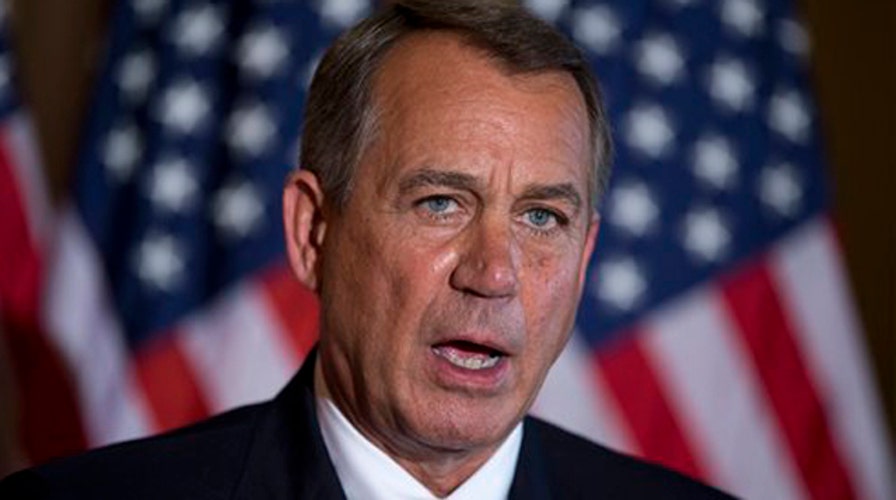In the early days of the Great Government Shutdown — way back last week — the right and left were clashing over whether this was pandemonium or a pinprick.
Conservative commentators kept minimizing the impact of furloughing 800,000 federal workers and forcing agencies to run on skeletal staffs. Liberal pundits painted a picture that was just this side of Armageddon.
But now that most of them have come to a rough consensus that actual pain is being inflicted, the dispute is over whether that’s intentional.
A growing refrain in conservative circles is that President Obama, who polls show is getting far less blame for this mess than the Republicans, wants to stick it to the folks. In this view, the more people are hurting, the more the pressure grows on the GOP to reopen the government and perhaps cave on the debt ceiling as well. Bad news is good news for the administration, according to this political indictment.
In liberal circles, that view is flipped on its head. Yes, many Americans are suffering, but that’s because the GOP was insensitive in forcing the shutdown in the first place. The Republicans hate government, but are happy to cynically highlight what happens when federal support is taken away. They set the blaze and are now carping that the fire department isn’t showing up!
The question flared up again yesterday when John McCain, reacting to a news story, took to the Senate floor over the suspension of death benefits to help military families pay for funerals and for travel to receive the bodies of the fallen. The families of five American service members killed in Afghanistan over the weekend did not receive the customary $100,000 payment.
“Shouldn’t we as a body, Republican or Democrat — shouldn’t we be embarrassed? Ashamed?” McCain asked.
It came up again at Obama’s lengthy news conference, when the only tough question came from CBS’s Mark Knoller, asked why the president wouldn’t sign the GOP’s piecemeal bills to restore funding for FEMA, Head Start and veterans’ benefits. And Obama admitted that he wanted to keep up the pressure on the other party.
“If there's no political heat, if there's no television story on it, then nothing happens,” he said. “And if we do some sort of shotgun approach like that, then you'll have some programs that are highly visible get funded and reopened, like national monuments, but things that don't get a lot of attention, like those [Small Business Administration] loans, not being funded.”
Thus the question of whether the idiocy of the shutdown itself is to blame, or the intransigence of an administration that doesn’t want to allow cherry-picking after the fact.
National Review fires a major salvo in what it calls “Vindictive Shutdown Theater”:
“Consider the case of Ralph and Joyce Spencer, 77 and 80 years of age, respectively, who were evicted from their home on Lake Mead in Nevada by an officious park ranger who told them they had 24 hours to vacate the premises. The Spencers own their home outright, but it sits on land leased from the federal government. A lease is a legal contract, and the government shutdown presents no legitimate reason for the violation of that contract. Even if it did, the place to settle such a dispute is in a court of law — not through the arbitrary exercise of federal police power. This is not a blunder: It is the malicious harassment of private citizens in their own homes by an administration intent on creating hardships and then using them for propaganda purposes. You own your home right up until the moment when that the fact becomes inconvenient to President Obama…"
“The point of this federal propaganda exercise is obvious: The administration seeks to gin up ill will against the Republican-controlled House of Representatives for refusing to crumble when Obama and the Senate peremptorily refuse to even consider its proposals. But there is a bit more to it than that. The Obama administration cleaves to the notion that ‘government is the only thing we all belong to,’ as the Democrats put it during their 2012 convention, and it seeks to put the state at the center of national life. That the government has resorted to turning old people out of their homes suggests a level of ruthlessness that is shocking if not surprising. The Democrats have called their opponents ‘hostage-takers’ in this matter — but they are the ones conducting seizures.”
The conservative CNS finds a heart-rending example, as liberal sites were doing last week:
“The Clinical Center at the National Institutes of Health has suspended its dog therapy program because of the government shutdown, according to John Burklow, spokesperson for NIH.
“Burklow said the dogs, which pay visits to patients in the hospital, including children with cancer, have to seen by veterinarians, and a ‘team’ on staff made the decision to suspend program. ‘A vet needs to evaluate the dogs, and given that there is a 25 percent reduction in staff (furloughed), we focus our activities and staffing on the care of patients already at our hospital,’ Burklow said.”
On the left, the Huffington Post, which has devoted lots of space to the human impact of the shutdown, is back with more:
“Oct. 1 was not Natalia Otero's best day on the job."
“As executive director of DC Safe, a nonprofit that provides emergency services and shelter to victims of domestic violence in Washington, her organization may not seem like a potential victim of a federal government shutdown. But at the turn of the month, with Congress deadlocked, $250,000 in federal and local grants for DC Safe were effectively frozen."
“That quarter of a million dollars would have paid cab fare for battered women to travel from a hospital emergency room to a shelter. It would have paid for food to families who left an abusive home. It would have paid for hotel stays when the shelters were full. It would have paid for women to get the locks changed on their doors.”
HuffPost also lists 50 examples culled from local newspapers:
"1. Border patrol training has been suspended in New Mexico."
"2. Businesses, including a hot dog store in Columbus, Ohio, can't get their government-backed Small Business Administration loans."
"3. Congress' failure to consider a farm bill because of the shutdown is hurting dairy farmers."
"4. Sugar daddy websites, focusing on relationships that feature older men who spend lavishly on women, are witnessing a spike in interest, which some website operators attribute to young women losing government benefits."
My response: There are sugar daddy websites??
Ironies abound. This Washington Post report on the impact in Colorado notes that physicist David J. Wineland, who won last year’s Nobel Prize for research related to superfast computing, has been furloughed by the National Institute of Standards and Technology. “I’m just another worker, another non-essential,” he said.
This sort of thing underscores the meat-ax approach of the shutdown. One day, 350,000 Pentagon workers are furloughed; the next, Chuck Hagel calls them back (minimizing the overall impact and undermining the theory that the administration wants to inflict maximum pain).
This Wall Street Journal post hints at what lies ahead:
“The Social Security Administration has begun warning the public it cannot guarantee full benefit payments if the debt ceiling isn’t increased."
“When asked by the public, the agency is notifying beneficiaries that ‘Unlike a federal shutdown which has no impact on the payment of Social Security benefits, failure to raise the debt ceiling puts Social Security benefits at risk,’ according to a person familiar with the agency directive.”
I think we can all agree, without fear of contradiction, that this thing would be over in 10 minutes once seniors stop getting their checks.
The Eternal Horse Race
You aren’t imagining things: the 2016 campaign coverage has ramped up far beyond what we’ve seen in the past.
The Pew Research Center, in a review of 15 top newspapers, found 335 stories about the next presidential campaign in roughly the first nine months of this year.
That is more than double the 132 stories written in the same period in 2009 about the coming campaign. Even compared to 2005, when both parties faced nomination battles in the next contest, there were 28 percent more stories this year (despite a decline in the overall output of newspaper stories).
This totally understates the tsunami of 2016 talk, in my view, because it doesn’t include endless cable segments or the punditry on Twitter, which wasn’t even a factor in 2008.
Much of this, not surprisingly, is Hillary-driven: Clinton topped the list in the newspaper stories, with 66 describing her as a potential candidate. She was followed by Marco Rubio (52), Rand Paul (48) and Chris Christie (45), who in turn were trailed by Joe Biden (35).





